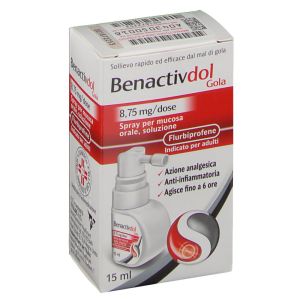Ship in Europe, Find out rates!
Benactivdol Throat Flurbiprofen 8,75mg Oral Mucosa Spray 15ml

- box Delivery in Italy in 24/48 and free returns
- star3.000+ positive reviews
- dropboxOver 60,000 products in the catalog
Therapeutic indications
Benactivdol Throat is indicated for the short-term symptomatic treatment of acute pain in sore throat in adults.
Dosage
For oromucosal administration and only for short-term treatments. Indicated for adults over 18 years of age: One dose (3 sprays) addressed to the affected part of the throat every 3–6 hours as needed, up to a maximum of 5 doses in a 24 hour period. Do not inhale while dispensing. This medicine should not be used for more than 3 days. Before use, it is necessary to operate the pump 4 times, aiming the regulator away from your body, until a uniform and consistent nebulization is released. The pump is then ready for use. Between one use and the next, dispense a minimum quantity of product, away from your body, in order to ensure that the atomization is uniform and consistent. Before using the product, always make sure that the spray is uniform and consistent. Pediatric population The safety and efficacy of Benactivdol Gola have not been established in children or adolescents below 18 years of age. Elderly population A general dosing recommendation cannot be given as clinical experience to date is limited. The elderly are at increased risk of serious consequences in case of adverse reactions. Administer the lowest effective dose for the shortest possible duration of treatment needed to control symptoms (see section 4.4).
Overdose
Symptoms The majority of patients who have ingested clinically significant amounts of NSAIDs will develop nausea, vomiting, epigastric pain, or more rarely diarrhea. Tinnitus, headache and gastrointestinal bleeding are also possible. In more severe cases of NSAID intoxication, central nervous system toxicity is observed, manifesting as drowsiness, occasionally excitability, blurred vision, and disorientation or coma. Occasionally patients develop seizures. In the event of severe NSAID intoxication, metabolic acidosis may occur and the prothrombin time / INR may be prolonged, possibly due to interference with the action of circulating coagulation factors. Acute renal failure and liver damage can occur. An exacerbation of asthma in asthmatics is possible. Treatment Treatment should be symptomatic and supportive and should include maintaining a patent airway and monitoring cardiac function and vital signs until stabilization. Oral administration of activated charcoal or gastric lavage and, if necessary, correction of serum electrolytes should be considered if the patient presents within one hour of ingesting a potentially toxic amount. Seizures should be treated with intravenous diazepam or lorazepam if they are frequent or prolonged. Administer bronchodilators for asthma. There is no specific antidote for flurbiprofen.
Contraindications
• Hypersensitivity to flurbiprofen or to any of the excipients listed in section 6.1. • Patients who have previously experienced hypersensitivity reactions (eg asthma, bronchospasm, rhinitis, angioedema or urticaria) in response to acetylsalicylic acid or other NSAIDs. • Patients with recurrent peptic ulcers / bleeding in progress or in the past (two or more distinct episodes of proven ulceration) and intestinal ulceration. • Patients with a history of gastrointestinal bleeding or perforation, severe colitis, haemorrhagic or haematopoietic disorders related to previous NSAID therapy. • Last trimester of pregnancy (see section 4.6). • Severe heart failure, renal failure or hepatic failure (see section 4.4). • Children and adolescents under the age of 18.
Side effects
Hypersensitivity reactions to NSAIDs have been reported and these may consist of: (a) non-specific allergic reactions and anaphylaxis (b) respiratory tract reactivity, e.g. asthma, aggravated asthma, bronchospasm, dyspnoea (c) various skin reactions e.g. pruritus, urticaria, angioedema and, more rarely, exfoliative and bullous dermatosis (including epidermal necrolysis and erythema multiforme). Edema, hypertension and heart failure have been reported in association with NSAID treatment. There are insufficient data to exclude this risk following the use of flurbiprofen oral mucosal spray, solution. The list of adverse effects below refers to the clinical evaluation performed with flurbiprofen, used in the short term and at doses compatible with the OTC classification. (Very common (≥1 / 10), Common (≥1 / 100 to <1/10), Uncommon (≥1 / 1000 to <1/100), Rare (≥1 / 10,000 to <1 / 1000), Very rare (<1/10000), not known (cannot be estimated from the available data)). Blood and lymphatic system disorders Not known: Anemia, Thrombocytopenia. Cardiovascular and cerebrovascular disorders : Not known: Edema, Hypertension, Heart failure. Nervous system disorders : Common: Dizziness, Headache, Paraesthesia. Uncommon: Somnolence. Respiratory, thoracic and mediastinal disorders : Common: Irritation of the throat. Uncommon: exacerbation of asthma and bronchospasm, dyspnoea, wheezing, oropharyngeal blistering, pharyngeal hypoesthesia. Gastrointestinal disorders : Common: Diarrhea, Mouth ulceration, Nausea, Oral pain, Oral paraesthesia, Oropharyngeal pain, Oral discomfort (hot or burning sensation, tingling in the mouth). Uncommon: Abdominal distension, Abdominal pain, Constipation, Dry mouth, Dyspepsia, Flatulence, Glossodynia, Dysgeusia, Oral dysesthesia, Vomiting. Skin and subcutaneous tissue disorders : Uncommon: Various skin rashes, Pruritus. Not known: Severe skin reactions such as bullous reactions, including Stevens – Johnson Syndrome and Toxic Epidermal Necrosis. General Disorders and Administration Site Conditions : Uncommon: Pyrexia, Pain. Immune system disorders : Rare: Anaphylactic reaction. Psychiatric disorders : Uncommon: Insomnia. Hepatobiliary disorders : Not known: Hepatitis Reporting of suspected adverse reactions Reporting suspected adverse reactions after authorization of the medicinal product is important, as it allows continuous monitoring of the benefit / risk ratio of the medicinal product. Healthcare professionals are asked to report any suspected adverse reactions via the national reporting system at www.agenziafarmaco.gov.it/it/responsabili.
Pregnancy and breastfeeding
Pregnancy Inhibition of prostaglandin synthesis can adversely affect pregnancy and / or embryonic / fetal development. Data obtained from epidemiological studies suggest an increased risk of miscarriage, cardiac malformations and gastroschisis following the use of a prostaglandin synthesis inhibitor in early pregnancy. The absolute risk of cardiovascular malformations was increased from less than 1% to approximately 1.5%. The risk is believed to increase with dose and duration of therapy. In animals, administration of a prostaglandin synthesis inhibitor has been shown to cause increased pre- and post-implantation losses and embryo-fetal lethality. In addition, an increased incidence of various malformations, including cardiovascular ones, has been reported in animals given a prostaglandin synthesis inhibitor during the organogenetic period. Flurbiprofen must not be administered during the first and second trimester of pregnancy. During the third trimester of pregnancy, all prostaglandin synthesis inhibitors can expose • the fetus to: • cardiopulmonary toxicity (with premature closure of the arterial duct and pulmonary hypertension); • renal dysfunction which may progress to renal failure with oligo – hydramnios. • the mother and the newborn, at the end of pregnancy, to: • possible prolongation of the bleeding time, an antiplatelet effect which can occur even at very low doses. • inhibition of uterine contractions resulting in delayed or prolonged labor. Consequently, flurbiprofen is contraindicated during the third trimester of pregnancy (see section 4.3). Breastfeeding In a limited number of studies, flurbiprofen appears in breast milk at very low concentrations and is unlikely to have adverse effects on the breastfed infant. However, due to the possible adverse effects of NSAIDs on breastfed infants, the use of flurbiprofen spray by nursing mothers is not recommended. Fertility There is evidence indicating that cyclooxygenase / prostaglandin synthesis inhibitors may cause impairment of female fertility by an effect on ovulation. This is reversible upon discontinuation of treatment.
Special warnings
Undesirable effects can be minimized by using the lowest effective dose for the shortest duration of treatment needed to control symptoms. Infections Since isolated cases of infection-related exacerbation of inflammation (e.g. development of necrotizing fasciitis) have been reported in temporal association with systemic use of NSAID drugs, it is recommended that patients seek immediate medical attention in if signs of a bacterial infection appear or worsen during flurbiprofen spray therapy. A possible indication should be considered at the start of antibiotic therapy. In case of purulent bacterial pharyngitis / tonsillitis, the patient should consult the physician for a re-evaluation of the treatment. Treatment should not be administered for more than 3 days. Treatment should be re-evaluated if symptoms worsen or new symptoms occur. If mouth irritation develops, flurbirprofen treatment should be discontinued. Elderly population The elderly experience an increased frequency of adverse reactions to NSAIDs, especially gastrointestinal bleeding and perforation, which can be fatal. Respiratory disorders Bronchospasm may be precipitated in patients suffering from or with a history of bronchial asthma or allergic disease, Flurbiprofen spray should be used with caution in these patients. Other NSAIDs The use of flurbiprofen spray should be avoided concomitantly with other NSAIDs, including selective cyclooxygenase-2 inhibitors (see section 4.5). Systemic lupus erythematosus (SLE) and mixed connective tissue disease Patients with systemic lupus erythematosus (SLE) and mixed connective tissue disease may have an increased risk of aseptic meningitis (see section 4.8), however this effect is not usually seen with products intended for short-term use as a flurbiprofen spray Cardiovascular, renal and hepatic impairment NSAIDs have been reported to cause various forms of nephrotoxicity, including interstitial nephritis, nephrotic syndrome and renal failure. Administration of an NSAID can cause a dose-dependent reduction in prostaglandin formation and precipitate renal failure. Patients at the highest risk of developing this reaction are those with impaired renal function, cardiac impairment, hepatic dysfunction, those on diuretic therapy and the elderly; this effect is not usually seen with products intended for short-term use such as flurbiprofen spray. Hepatic effects Mild to moderate hepatic dysfunction (see sections 4.3 and 4.8). Cardiovascular and cerebrovascular effectsBefore starting treatment in patients with a history of hypertension and / or heart failure, caution is required (discuss with your doctor or pharmacist) as fluid retention, hypertension and edema. Data from clinical and epidemiological studies suggest that the use of some NSAIDs (particularly at high doses and in long-term treatments) may be associated with a slightly increased risk of arterial thrombotic events (e.g. myocardial infarction or stroke). There are insufficient data to exclude this risk with flurbiprofen when administered at less than 5 times a day (3 puffs of each dose). Effects on the central nervous system Analgesic-induced headache - Headache may occur with prolonged or unregulated use of analgesics and should not be treated by increasing the dose of the medicinal product. Gastrointestinal disorders NSAIDs should be administered with caution to patients with a history of gastrointestinal disorders (ulcerative colitis, Crohn's disease) as these conditions may be exacerbated (see section 4.8). Gastrointestinal bleeding, ulceration or perforation, which can be fatal, have been reported with all NSAIDs at any time during treatment, in the presence or absence of warning symptoms or a history of serious gastrointestinal events. The risk of gastrointestinal bleeding, ulceration or perforation is higher with increasing NSAID doses, in patients with a history of ulcer, especially if complicated with haemorrhage or perforation (see section 4.3) and in the elderly; this effect is not usually seen with products intended for short-term use such as flurbiprofen spray. Patients with a history of gastrointestinal toxicity, particularly the elderly, should report any unusual abdominal symptoms (especially gastrointestinal bleeding) to their treating physician. Caution should be advised in patients receiving concomitant medications that may increase the risk of ulceration or bleeding, such as oral corticosteroids, anticoagulants such as warfarin, selective serotonin reuptake inhibitors or antiplatelet agents such as acetylsalicylic acid (see section 4.5). When gastrointestinal bleeding or ulceration occurs in patients taking flurbiprofen, treatment should be stopped. Haematological Effects Flurbiprofen, like other NSAIDs, can inhibit platelet aggregation and prolong bleeding time. Flurbiprofen spray should be used with caution in patients with potential bleeding abnormalities. Dermatological effects Serious skin reactions, some of them fatal, including exfoliative dermatitis, Stevens – Johnson syndrome and toxic epidermal necrolysis, have been reported very rarely in association with the use of NSAIDs (see section 4.8). Flurbiprofen spray should be discontinued at the first appearance of rash, mucosal lesions or any other signs of hypersensitivity. This product contains methyl parahydroxybenzoate and propyl parahydroxybenzoate which can cause allergic reactions (sometimes even delayed).
Expiry and Retention
Do not refrigerate or freeze.
Active principles
One dose (3 puffs) contains 8.75 mg of Flurbiprofen, corresponding to 16.2 mg / ml of Flurbiprofen Excipients with known effect: 1.18 mg / dose Methyl parahydroxybenzoate (E218) 0.24 mg / dose Propyl parahydroxybenzoate (E216 ) For the full list of excipients, see section 6.1.
Excipients
Betadex Dibasic sodium phosphate dodecahydrate Citric acid monohydrate Methyl parahydroxybenzoate (E218) Propyl parahydroxybenzoate (E216) Sodium hydroxide Mint aroma Cherry aroma N, 2,3-Trimethyl-2-isopropylbutanamide Sodium saccharin Hydroxypropylbetadex Aroma purified composition Flavoring preparation Propylene glycol E1520 Glyceryl triacetate (Triacetin) E1518 Qualitative composition of the aroma Cherry: Flavoring substances Flavoring preparation Propylene glycol E1520 Water
| Destination | Cost | Detail |
|---|---|---|
| Italy | €5,90* | 24/72H |
| Austria, France, Germany, Slovenia | € 13* | 3 days |
| Belgium, Luxembourg, Portugal, Netherlands, Spain | € 14* | 4 days |
| Bulgary, Cechia, Hungary, Poland, Romania, Slovakia | € 19* | 5 days |
| Denmark, Estonia, Finland, Ireland, Lithuania, Latvia ,Sweden | € 22* | 5 days |
| United Kingdom, Switzerland, Greece, Malta/td> | € 30* | 7 days |
| Canada | € 40 | 7 Days |
European shipments with express courier: FedEx, MBE, DHL
*For the shipment outside band B ther's an extra cost of 22€ *For the shipment outside band C ther's an extra cost of 30€ Delivery Times exclude Saturday and Holidays
For Islands and Areas of difficult Accessibility the shipments are made in 72 hours and the cost will be increased by 15€


